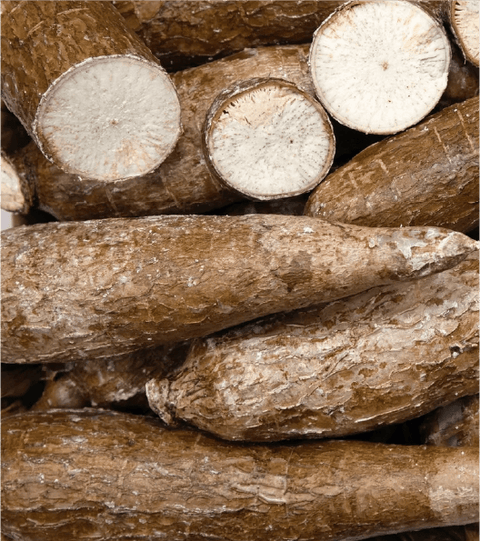In the ever-evolving world of food trends, gluten-free options have become a top priority for many people. Whether it's due to health concerns, dietary restrictions, or simply a desire to experiment with alternative ingredients, gluten-free cooking is gaining momentum. One star that’s emerging in this arena is yuca, also known as cassava.
This versatile root vegetable has taken center stage in kitchens around the world, not just for its gluten-free properties, but for its culinary flexibility, health benefits, and cultural significance. So, why exactly is yuca becoming such a popular ingredient in gluten-free cooking? Let’s dive in!
1. The Rise of Gluten-Free Diets
Over the past decade, gluten-free diets have moved from niche to mainstream. While originally necessary for those with celiac disease or gluten sensitivity, many people have embraced this diet for its potential health benefits, such as improved digestion, reduced bloating, and even weight management. As a result, the demand for gluten-free ingredients has skyrocketed, pushing food manufacturers and home cooks to explore alternatives to traditional wheat-based flours and grains.
This is where yuca comes in. Unlike wheat, barley, or rye, yuca is naturally gluten-free, making it a go-to option for anyone looking to eliminate gluten from their diet. However, what makes yuca stand out from other gluten-free alternatives, such as rice or corn, is its unique texture, neutral flavor, and culinary adaptability.
2. Versatility in the Kitchen
One of the biggest reasons why yuca is gaining popularity is its versatility. Yuca can be prepared in various ways, making it a flexible ingredient for different dishes and cooking techniques. Here are some of the many ways yuca is used in the kitchen:
-
Yuca Fries: As an alternative to traditional potato fries, yuca fries are crispy on the outside and tender on the inside. They are perfect for people looking for a new twist on a classic comfort food.
-
Cassava Flour: Perhaps the most exciting application of yuca in gluten-free cooking is the use of cassava flour. Made from dried and ground yuca root, cassava flour is a game-changer for baking. Unlike some other gluten-free flours (which can be dense or have a strong flavor), cassava flour is light, neutral in taste, and can be used as a 1:1 substitute for wheat flour in many recipes. This makes it a fantastic option for gluten-free bread, cakes, cookies, and even pizza crusts.
-
Yuca Porridge: In various cultures, yuca is boiled, mashed, and turned into a porridge-like dish, which is both comforting and nutritious. It serves as a great base for savory or sweet toppings, offering versatility for breakfast, lunch, or dinner.
-
Tapioca: Yuca is also the source of tapioca, a starch extracted from the root. Tapioca is used in everything from pudding to bubble tea, and it's also a great thickener for soups and sauces in gluten-free cooking.
-
Flatbreads and Tortillas: Yuca dough can be used to make flatbreads, tortillas, or even pizza crusts. These options provide a satisfying and gluten-free alternative to regular wheat-based products.
The beauty of yuca is that it can take on a variety of forms—boiled, fried, roasted, or baked. Its ability to adapt to different cooking styles makes it an attractive choice for chefs and home cooks alike.
3. A Nutrient-Dense Alternative
While yuca is primarily a carbohydrate-rich root, it also boasts several key nutrients that contribute to its appeal as a healthy ingredient. Unlike many processed gluten-free options, yuca provides:
-
High Fiber Content: Yuca is an excellent source of dietary fiber, which is essential for healthy digestion. Fiber helps regulate bowel movements, lowers cholesterol, and supports gut health, making yuca a more wholesome choice than many other gluten-free alternatives.
-
Rich in Vitamin C: Yuca contains significant amounts of vitamin C, which is important for immune function, skin health, and the absorption of iron from plant-based foods.
-
Potassium: This essential mineral helps regulate fluid balance in the body and supports muscle function. Potassium-rich foods, like yuca, can also help reduce the risk of stroke and support heart health.
4. An Ancient Ingredient with Cultural Significance
Yuca has been a dietary staple for thousands of years, particularly in Latin America, Africa, and parts of Asia. In these regions, it is more than just a food—it’s a part of their cultural heritage. For example, yuca is commonly used in traditional dishes such as “bollos” in Colombia or “farofa” in Brazil. As global interest in traditional and ancestral foods grows, so does yuca’s presence in modern kitchens.
For many people, the appeal of yuca lies not only in its versatility but also in its connection to traditional ways of cooking. By embracing yuca, modern consumers are celebrating the heritage of these ancient cultures and their knowledge of sustainable, whole foods.
5. A Sustainable Crop for a Changing World
Another factor driving yuca’s popularity is its sustainability. Yuca is a hardy, drought-resistant crop that can grow in poor soils, making it an essential food source in many developing countries. As concerns about climate change and food security continue to grow, there is a greater emphasis on crops that require fewer resources and can thrive in diverse environments.
Yuca fits the bill. Its ability to grow in a wide range of conditions makes it a more sustainable alternative to wheat, corn, and other grains that require more water and nutrients. Additionally, its versatility means that little is wasted, as the root can be used in a variety of forms, from flour to starch to whole foods.
6. Yuca in the World of Gluten-Free Food Trends
As gluten-free cooking continues to evolve, more and more chefs, food bloggers, and home cooks are discovering the potential of yuca. It has quickly become a star ingredient in the world of gluten-free recipes, especially as people search for healthier, whole-food alternatives to processed gluten-free products. Yuca’s ability to take on different textures and flavors while offering nutritional benefits has earned it a reputation as a "superfood" for gluten-free diets.
Influencers and Chefs Love Yuca
Yuca’s rise in popularity can be attributed to its promotion by influencers and chefs in the gluten-free and health-conscious community. From food bloggers experimenting with cassava flour in their baked goods to well-known chefs featuring yuca-based dishes on their menus, the spotlight is on this versatile root vegetable. Its growing presence in gluten-free cookbooks and cooking shows further solidifies its place as a top ingredient in modern kitchens.
Incorporating yuca into gluten-free cooking isn’t just a passing trend—it’s a smart, versatile, and sustainable choice. Whether you’re using it to make delicious yuca fries, crafting gluten-free flatbreads with cassava flour, or simply exploring its rich cultural history, yuca has something to offer everyone. As gluten-free cooking continues to grow, yuca’s unique properties and health benefits ensure that it will remain a staple ingredient in kitchens worldwide for years to come.



